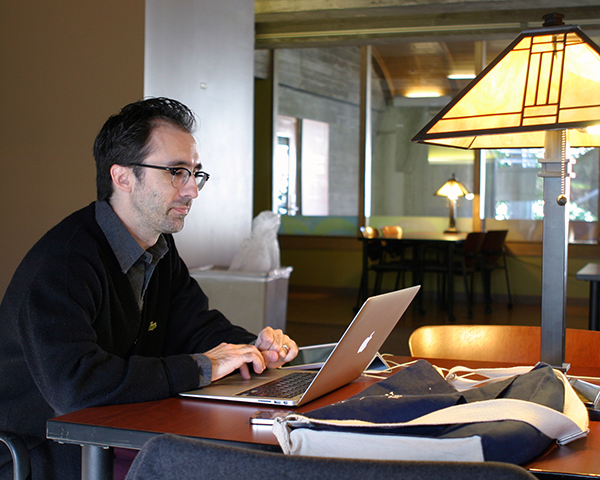
Mark Kawasaki (Integration) is a believer that productivity can be enhanced by making the process dynamic and enriching. To this end, he underwent an experiment in creating a virtual office at Emory this past Fall.
In the beginning he found that he was out and about quite a bit anyway and he found that when he was in his office he felt that was missing out on what he could be experiencing. His idea was to take 30 days and see what it would be like to work in OIT as a fully mobile entity, with no office, but instead working in various locations around campus.
He was curious about the challenges he would face of working remotely, using the wireless network, carrying all of his materials, not having a desk phone, etc. He blogged about those challenges at https://blogs.emory.edu/digitaldooley/ to talk about the challenges and benefits.
Mark didn’t set out to go on a mission to discover things, but it quickly turned into experiences he found very valuable. Being around our customers and business partners was very eye-opening and gave Mark a greater sense for their needs from what OIT provides. “It is amazing how you can work in a university setting and never think about students,” observed Mark.
Some of his experiences included sitting in on lectures and seeing how people utilize and/or struggle with technology, meeting other IT units and learning about their experiences and challenges, and observing student usage of OIT services.
As a result of the experience, Mark decided to make his virtual office permanent. The challenge has been to make sure the dynamics of working remotely still allows him to foster strong team dynamics and relationships. He always tries to attend meetings in person and as a result ends up working somewhat longer hours to account for the extra travel time. Mark believes it is also important to technologically recreate the sensation of yelling across the hall to your co-worker.
Mark plans to publish a comprehensive guide for working remotely on campus that includes descriptions of various locations in terms of atmosphere, setting, network connectivity, dining options, the ability to take a call, etc. For instance, the Theology Library is a great space to work, but extremely quiet. Brooks Commons has a patio that allows for more flexibility.
The point of this experiment is to connect to the value that Emory provides, as well as the objectives of each school and business unit. Finding out what people are working and why, then discerning how OIT can support those efforts. “It is amazing what you can actually learn when you get out of the office and listen to conversations,” says Mark. “We may understand what services we provide, but we don’t always understand what those services are being used for. Finding visibility all the way through to the customer is the key.”
Mark says that while everyone cannot be totally virtual, he believes it is important for every employee to take a day or two a year to get out on campus and experience what Emory is all about.

Leave a Reply